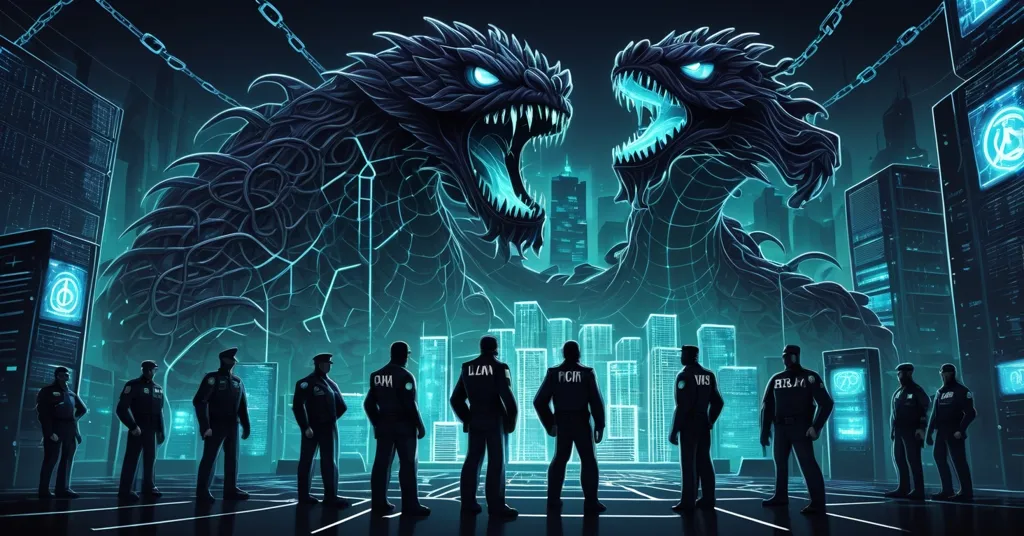Russian Authorities Seize $8.2M in Crypto as Darknet Markets Surge 68% in 2024

Russian Authorities Seize $8.2 Million in Crypto from Hydra Operator as Darknet Markets Defy Global Decline
Russian law enforcement has landed a significant blow against the remnants of Hydra, once the world’s largest darknet marketplace, by seizing $8.2 million in cryptocurrency from a key operative. Yet, even as authorities tighten the screws, Russian darknet markets are booming, revealing the persistent underbelly of crypto-fueled cybercrime.
- Seizure Impact: $8.2 million (649 million rubles) in crypto taken from Dmitry Pavlov, Hydra’s server operator.
- Hydra’s Dominance: Over $5 billion in transactions, with $1.7 billion annual turnover at its 2022 shutdown.
- Russian Darknet Surge: 68% sales increase in 2024, against a 15% global drop, per Chainalysis.
Hydra’s Fall: A High-Stakes Seizure
Dmitry Pavlov, a 35-year-old who confessed to operating servers for Hydra, became the latest target of Russian investigators. They raided his digital wallets, confiscating cryptocurrency worth 649 million rubles—about $8.2 million, as detailed in official court documents. Pavlov earned nearly $190,000 annually in crypto as salary and bonuses for keeping Hydra’s servers running, admitting he held onto these assets hoping for a price surge. Talk about a bad bet; his bullish dreams were crushed by a very centralized hammer. He also received monthly cash payments of around $19,000 to $25,000 for server maintenance at Hetzner, a German hosting firm, often delivered by couriers in old-school bags of cash—a detail straight out of a crime thriller.
The Darknet Titan: Hydra’s Staggering Scale
Hydra wasn’t just a marketplace; it was a digital underworld empire. Launched in 2015, it catered primarily to Russian-speaking users, offering everything from drugs to stolen data through encrypted networks like Tor. For the uninitiated, the darknet is a hidden layer of the internet where anonymity reigns, accessible only via specialized software, making it a haven for illicit trade. Hydra facilitated over $5 billion in crypto transactions before its shutdown in April 2022, with an annual turnover of $1.7 billion at its peak, as revealed by a Rosfinmonitoring insider, Russia’s top anti-money laundering agency. Its business model was brutal yet slick, skimming 2% to 5% commissions on every deal, netting its co-founders an estimated $1.3 billion yearly—100 billion rubles—according to court expert testimony. For more on its operations, check this historical overview of Hydra.
Legal Fallout: Cracking Down on Hydra’s Core
The hammer of justice has been unrelenting. Hydra’s alleged founder, Stanislav Moiseev, was sentenced to life imprisonment by a Moscow District Court in December of the prior year, with 16 associates jailed for 8 to 23 years, as reported in recent case updates. But here’s a red flag: while Russian state media like TASS named Moiseev as the mastermind, the Moscow Prosecutor’s Office hasn’t officially confirmed his role. This opacity fuels skepticism—could this be a convenient scapegoat or a politically charged narrative? Transparency matters, especially in a nation where official stories often hide more than they reveal, and it’s a reminder to question who really pulls the strings in these cybercrime empires.
The Hydra takedown wasn’t just a Russian affair. In 2022, German and U.S. law enforcement collaborated to seize servers and $25 million in Bitcoin, marking one of the biggest darknet busts since Silk Road’s fall over a decade ago, with community reactions captured on platforms like Reddit discussions. U.S. Attorney General Merrick B. Garland didn’t mince words on the global resolve to hunt these networks:
“The Justice Department will be relentless in our efforts to hold accountable those who violate our laws – no matter where they are located or how they try to hide their crimes.”
FBI Director Christopher Wray doubled down, emphasizing the power of international teamwork to dismantle the “entire illicit ecosystem that drives and enables crime.” Pavlov’s $8.2 million seizure is just one piece of a sprawling asset recovery puzzle, showing that the fight is far from over.
Russian Darknet Resurgence: A 68% Boom Amid Global Decline
Here’s the kicker: while Hydra’s collapse was a victory for law enforcement, it hasn’t killed the beast—it’s just mutated. Blockchain analytics firm Chainalysis reports that while global darknet crypto sales dropped by 15% in 2024, Russian markets saw a staggering 68% surge. New players like Kraken—not to be confused with the legit crypto exchange—have filled Hydra’s void, racking up $737 million in on-chain sales this year alone, as highlighted in a detailed sales analysis. Vendors are getting craftier, storing more crypto on-chain and using decentralized finance (DeFi) platforms to cash out, dodging the know-your-customer (KYC) checks on centralized exchanges. Some have ditched Bitcoin for privacy coins like Monero, which hide transaction details unlike Bitcoin’s open ledger.
For newcomers, DeFi is like a digital vending machine for financial services—think loans or trades without a bank as the middleman—built on blockchains like Ethereum. Privacy coins, meanwhile, are like masked bank transactions, obscuring who’s sending what to whom. This shift shows darknet operators adapting faster than a cockroach after a nuclear blast. Shutting down Hydra didn’t end the game; it just scattered the pieces, with new markets leveraging tech in ways harder to trace, a trend explored in Chainalysis’ latest report. Geopolitical pressures add fuel—Russia’s exclusion from systems like SWIFT due to sanctions likely pushes both criminals and ordinary folks to crypto as a financial lifeline, fertilizing the underground economy.
Crypto’s Double-Edged Sword: Freedom Meets Filth
Let’s cut the crap—Hydra and its successors expose cryptocurrency’s ugly side. The pseudonymity that makes Bitcoin a tool for bypassing oppressive regimes also makes it a magnet for money laundering and drug trafficking. But don’t kid yourself into thinking fiat is pure; cash has funded cartels and corruption for centuries with no blockchain to track the dirt. The difference? Accountability. Bitcoin’s public ledger, paired with analytics tools from firms like Chainalysis, lets authorities play detective, connecting wallet dots even without names attached. It’s how they nabbed Pavlov’s stash, peeling back the veil darknet crooks hide behind.
Yet, there’s a flip side we can’t ignore as decentralization advocates. Every transaction traced, every wallet flagged—while targeting parasites exploiting crypto’s freedom—erodes the privacy that drew us to this space. The same tech snaring a Hydra operator could tomorrow target a dissident using Bitcoin to fund resistance against authoritarian control. It’s a gut punch for privacy champions: how do we cheer disruption while grappling with tools that can undermine the very ethos of financial sovereignty? Insights into setting up such marketplaces shed light on this ongoing challenge, as discussed in darknet operation complexities.
Bitcoin vs. Altcoins: Who Owns the Darknet?
As Bitcoin maximalists, it stings to see our flagship protocol still a go-to for illicit actors. Hydra leaned heavily on BTC in its heyday, validating its utility but staining its rep. Yet, the shift to Monero and DeFi on Ethereum shows altcoins filling niches Bitcoin shouldn’t—and perhaps wasn’t meant to—touch. Privacy coins offer anonymity BTC can’t match, while DeFi provides cash-out routes beyond centralized choke points. We can argue Bitcoin should stay the king of value storage and peer-to-peer cash, not a darknet darling, letting other protocols handle the shadowy edges of this revolution. It’s a messy ecosystem, but that’s the price of innovation.
Geopolitical Shadows: Sanctions and Crypto Crime
Russia’s darknet boom isn’t just about tech—it’s tied to the broader chessboard. Sanctions have choked access to traditional finance, with systems like SWIFT off-limits, leaving crypto as a backdoor for both legit and illicit needs. Chainalysis data hints at soaring crypto adoption in sanctioned regions, and it’s no leap to see why underground markets thrive here, a dynamic explored in studies on the impact of sanctions on crypto activity. It’s a brutal irony: measures meant to isolate a nation may be supercharging its cybercrime scene. For us pushing effective accelerationism, this chaos is part of the deal—rapid adoption, even in dark corners, forces tech and policy to evolve faster, even if the road’s a damn mess.
Can Enforcement Keep Up?
So, are we winning against crypto crime, or just playing whack-a-mole with billion-dollar stakes? Hydra’s fall and Pavlov’s loss show authorities can hit hard, but Russian darknet markets are laughing in the face of global declines. New tactics—Monero, DeFi, even Telegram-based black markets—prove that innovation isn’t just for the good guys. We champion disruption and decentralization, but let’s not pretend it’s all rainbows. The fight for financial freedom is worth the battle, just don’t expect clean hands. As blockchain tech accelerates, so does the cat-and-mouse game, and the stakes for privacy, freedom, and security couldn’t be higher. Meanwhile, industry leaders continue to rally for unity in the crypto space to address such challenges, as noted in updates like recent advocacy efforts.
Key Takeaways and Questions on Hydra’s Legacy and Crypto Crime
- How Did Russian Authorities Target Hydra’s Crypto Assets?
Russian investigators seized $8.2 million in cryptocurrency from Dmitry Pavlov, Hydra’s server operator, demonstrating their growing ability to track and confiscate digital assets tied to darknet operations.
- What Made Hydra the Largest Darknet Marketplace?
Hydra dominated with over $5 billion in crypto transactions and a $1.7 billion annual turnover before its 2022 shutdown, leveraging a 2-5% commission model to become a titan of illicit trade in the Russian-speaking world.
- Why Are Russian Darknet Markets Surging in 2024?
Despite a 15% global drop in darknet crypto sales, Russian markets spiked by 68%, driven by successors like Kraken ($737 million in sales) and fueled by economic sanctions pushing reliance on crypto alternatives.
- How Does Crypto Enable Both Crime and Enforcement in Darknet Markets?
Crypto’s pseudonymity attracts illicit actors for untraceable deals, but public blockchains like Bitcoin allow analytics tools to track funds, creating a constant clash between criminal activity and law enforcement’s reach.
- Is Shutting Down Hydra Enough to Stop Illicit Crypto Activity?
No, Hydra’s closure merely fragmented the ecosystem; new markets adapt with harder-to-trace tools like Monero and DeFi, especially in Russia where geopolitical factors sustain underground economies.



